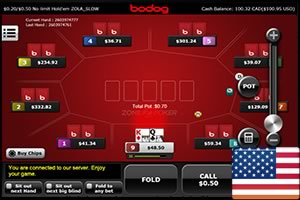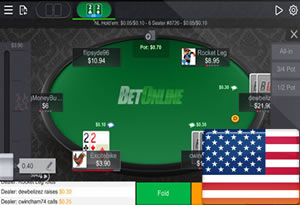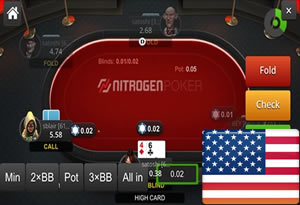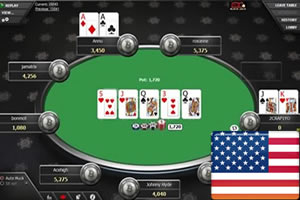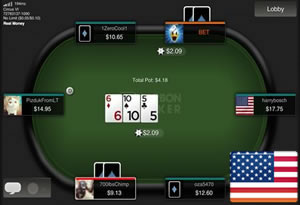United States Real Money Poker Apps
Until recently, it was not possible to play mobile poker for real-money in the United States. While U.S. players had a variety of options for playing online poker from their PC's, none of these poker rooms offered software for iOS, Android or Windows Phone devices. Thankfully real-money apps are now finally available.
U.S. based poker players can play Texas Hold'em and Omaha cash games on any iPhone, Samsung Galaxy or Microsoft Lumia tablet or smartphone. You still won't be able to download apps from the iOS App Store or Google Play, but you can now play from the browser of any internet-enabled device. These legal U.S. mobile poker sites offer regular ring games, Sit & Go's, Multi-Table tournaments and turbo poker. Since these apps are web based they will also work on touchscreen devices from BlackBerry and Nokia. We've written in-depth reviews of the top mobile poker sites that accept USA players. They also include detailed instructions on how to download and install each app.
U.S. based poker players can play Texas Hold'em and Omaha cash games on any iPhone, Samsung Galaxy or Microsoft Lumia tablet or smartphone. You still won't be able to download apps from the iOS App Store or Google Play, but you can now play from the browser of any internet-enabled device. These legal U.S. mobile poker sites offer regular ring games, Sit & Go's, Multi-Table tournaments and turbo poker. Since these apps are web based they will also work on touchscreen devices from BlackBerry and Nokia. We've written in-depth reviews of the top mobile poker sites that accept USA players. They also include detailed instructions on how to download and install each app.
|
IGNITION POKER (FORMERLY BOVADA)
USA ONLY - Running an U.S. facing online poker room just wasn't worth the legal heat for Bovada so they transferred their online poker room over to Ignition Casino. The player pool is the same and you won't notice any difference from the Bovada poker client apart from the logo. Play Hold'em and Omaha cash games on my phone in the USA. |
|
BETONLINE ANDROID/iOS USA POKER
BetOnline are on the popular Chico poker network that accepts players from the United States. They have developed an excellent real-money poker app that offer Hold'em/Omaha ring games, SNG's, private tables, multi-table tournaments and freerolls.
|
|
NITROGEN U.S. BITCOIN POKER APP
Nitrogen Sports are already the biggest bitcoin sportsbook. Now they're also offering mobile poker software that is compatible with any iOS, Android or Windows Phone device. You can take part in hourly freeroll tournaments, Sit and Go or Multi-Table tournaments. Hold'em and Omaha cash games are also available. |
|
BETCOIN - USA FRIENDLY BITCOIN POKER
Bitcoin poker rooms are becoming increasingly popular in the United States because they allow real money players to join anonymously. iPhone and Android users can play Betcoin poker on their phones by downloading the free Puffin browser that enables flash-based games. BetCoin are part of the high traffic Winning Poker Network. |
|
CARBON POKER MOBILE - U.S. FRIENDLY
Carbon Poker are currently having problems processing withdrawals for US-based players. As a results, we have temporarily suspended the site. Carbon Poker is a well known U.S. facing online poker room that now offers its players the chance to play real-money poker from their phones. Play Heads-Up, 6 Max and Full Ring games on any Droid, Windows Phone or iOS device. Compete in Sit & Go tournament at regular or turbo speed. Carbon is a no-download, instant play mobile poker site. |
The legality of online poker, as with all forms of online gambling, has had a bit of 'love-hate' history in the USA. US citizens love to play poker, but the government seems to hate the idea of them being able to do so online.
Many aspects of gambling in the US are viewed as being absolutely fine and are somewhat encouraged, such as spending countless dollars on lottery tickets. Indeed, all forms of wagering were thought okay in the US until the late 1890s when, after a serious of moralistic reforms swept across the country, all forms of gambling were banned.
1994 – The Online Poker Boom Begins
In 1994 the tiny Caribbean island of Antigua & Barbuda passed the “Free Trade and Processing Zone Act” which allowed online casino companies to set up operations with licences running under an Antiguan jurisdiction.
Soon, the internet flourished with online casinos and poker rooms. By 2001 US citizens were spending $3.5 billion a year on online gambling
The 'Moneymaker' Effect
The first really serious poker boom occurred in 2003 when complete unknown Chris Moneymaker entered a $39 WSOP satellite tournament at PokerStars and ended up winning the WSOP main event, and a $2.5 million prize. Hundreds of thousands of online poker newbs suddenly ended up signing for online poker rooms … however, this poker freedom was not to last very long.
In 2006 the US passed the 'Unlawful Internet Gambling Enforcement Act 2006 (UIGEA)' which to all intents and purposes banned financial institutions from allowing customers to use their accounts to fund their online gambling activities.
A handful of poker rooms, including PokerStars, Full Tilt Poker and Absolute Poker continued to admit US-based players, but in 2011 all three had their domains seized by the FBI. PokerStars and Full Tilt were forced to merge, and Absolute Poker ceased trading. Poker opportunities for US-based players were all but over.
The Rest Of The Poker World Goes Mobile
The mobile poker revolution had already begun to rumble by the time of the US's 2011 crackdown. The release of the iPhone in 2007 had sparked interest in mobile gaming, as smart-phones began to evolve beyond just being used for calls and texting. A small number of mobile games were released, and poker rooms began to sniff out opportunities of having mobile apps available for poker players who wanted to cram in a few poker hands while out and about.
Apple would have none of it, though. Apps could only be downloaded to the iPhone via iTunes, and Apple would not allow apps that encouraged real-money gambling to be hosted at their online store.
Eventually Bwin managed to crack Apple's resolve and they secured a mobile poker app on iTunes, however the app was only available to a select number of European countries and nowhere else.
Many aspects of gambling in the US are viewed as being absolutely fine and are somewhat encouraged, such as spending countless dollars on lottery tickets. Indeed, all forms of wagering were thought okay in the US until the late 1890s when, after a serious of moralistic reforms swept across the country, all forms of gambling were banned.
1994 – The Online Poker Boom Begins
In 1994 the tiny Caribbean island of Antigua & Barbuda passed the “Free Trade and Processing Zone Act” which allowed online casino companies to set up operations with licences running under an Antiguan jurisdiction.
Soon, the internet flourished with online casinos and poker rooms. By 2001 US citizens were spending $3.5 billion a year on online gambling
The 'Moneymaker' Effect
The first really serious poker boom occurred in 2003 when complete unknown Chris Moneymaker entered a $39 WSOP satellite tournament at PokerStars and ended up winning the WSOP main event, and a $2.5 million prize. Hundreds of thousands of online poker newbs suddenly ended up signing for online poker rooms … however, this poker freedom was not to last very long.
In 2006 the US passed the 'Unlawful Internet Gambling Enforcement Act 2006 (UIGEA)' which to all intents and purposes banned financial institutions from allowing customers to use their accounts to fund their online gambling activities.
A handful of poker rooms, including PokerStars, Full Tilt Poker and Absolute Poker continued to admit US-based players, but in 2011 all three had their domains seized by the FBI. PokerStars and Full Tilt were forced to merge, and Absolute Poker ceased trading. Poker opportunities for US-based players were all but over.
The Rest Of The Poker World Goes Mobile
The mobile poker revolution had already begun to rumble by the time of the US's 2011 crackdown. The release of the iPhone in 2007 had sparked interest in mobile gaming, as smart-phones began to evolve beyond just being used for calls and texting. A small number of mobile games were released, and poker rooms began to sniff out opportunities of having mobile apps available for poker players who wanted to cram in a few poker hands while out and about.
Apple would have none of it, though. Apps could only be downloaded to the iPhone via iTunes, and Apple would not allow apps that encouraged real-money gambling to be hosted at their online store.
Eventually Bwin managed to crack Apple's resolve and they secured a mobile poker app on iTunes, however the app was only available to a select number of European countries and nowhere else.
Poker Is Not Classified As Gambling Under Federal Law.
A Rush And A Push …
In 2010 Full Tilt Poker managed to get the entire poker world talking when they released 'Rush Poker', the world's first fast-fold poker variant. The concept was simple and tailor-made for both online poker and mobile poker – once you folded your cards at one table, instead of hanging around waiting for the remainder of the hand to play out you were instead whisked away to a completely different table where the deal was about to commence. This concept was not embraced by poker purists, but it enabled casual poker players to up their playing rate with a four or five-fold increase in the number of hands they played per hour.
Initially, US-based players were as welcome as anyone else at the Rush Poker tables, but the 2011 'Black Friday' crackdown swiftly put paid to that.
The Androids Are Coming
While US-based poker players were left to twiddle their thumbs in the mobile poker wilderness, the smart-phone and tablet revolution saw Apple lose their place as the dominant mobile operating system, as Google's Android OS began to take over the mobile world. Initially, Google had no problems in allowing poker and gambling apps to be hosted on Google Play, but had a change of heart and eventually banned them (just as Apple had a change of heart but in completely the opposite direction). However, due to the 'open source' nature of Android, poker rooms were free to develop their own apps that could easily be downloaded and installed on Android-powered devices without Google's intervention.
The development of HTML5 was another real game-changer in the mobile market. HTML5 allows apps to be hosted on a poker room's website, which can then run via a browser on a user's device without the need to download or install anything. Most poker rooms, casinos and software creators now develop HTML5 apps that run perfectly well in a web browser, moving away from dedicated, downloadable apps.
In From The Wilderness
2013 was the best year for quite some time to be a US-based online poker player. Rumblings of online gambling in the United States being made legal were mooted, complete with exploratory moves in New Jersey, Nevada and Delaware. In even better news the online poker room Carbon Poker released a mobile poker app that US-based players could use and play at with impunity.
The Carbon Poker mobile app featured no-limit and fixed-limit Texas Hold'em poker in full ring, 6max and heads-up modes. Such was the success of the initial release, Carbon soon added Sit & Go tournaments to the app, as well as an off-shoot permitting casino play and sports-betting.
Just over a year later, the mobile poker options for US-based players doubled when Bovada Poker released an HTML5-based poker client for iOS, Android, Windows and BlackBerry devices. Bovada also held no qualms about accepting US-based players, and via the app players could choose from Hold'em or Omaha, plus they could play 'Zone Poker' – Bovada's version of fast-fold poker.
While the US government's relationship with legalised and regulated online poker remains fractious, US-based players are no longer completely in the dark when it comes to their online poker-playing activities, mainly thanks to the efforts of Carbon Poker and Bovada Poker. While US-based online poker players are never likely to be able to completely join the poker party, at least they now have the opportunity to sneak in via the back door while no one's looking, and then sit down and see a few flops with the rest of the online poker-playing world.
In 2010 Full Tilt Poker managed to get the entire poker world talking when they released 'Rush Poker', the world's first fast-fold poker variant. The concept was simple and tailor-made for both online poker and mobile poker – once you folded your cards at one table, instead of hanging around waiting for the remainder of the hand to play out you were instead whisked away to a completely different table where the deal was about to commence. This concept was not embraced by poker purists, but it enabled casual poker players to up their playing rate with a four or five-fold increase in the number of hands they played per hour.
Initially, US-based players were as welcome as anyone else at the Rush Poker tables, but the 2011 'Black Friday' crackdown swiftly put paid to that.
The Androids Are Coming
While US-based poker players were left to twiddle their thumbs in the mobile poker wilderness, the smart-phone and tablet revolution saw Apple lose their place as the dominant mobile operating system, as Google's Android OS began to take over the mobile world. Initially, Google had no problems in allowing poker and gambling apps to be hosted on Google Play, but had a change of heart and eventually banned them (just as Apple had a change of heart but in completely the opposite direction). However, due to the 'open source' nature of Android, poker rooms were free to develop their own apps that could easily be downloaded and installed on Android-powered devices without Google's intervention.
The development of HTML5 was another real game-changer in the mobile market. HTML5 allows apps to be hosted on a poker room's website, which can then run via a browser on a user's device without the need to download or install anything. Most poker rooms, casinos and software creators now develop HTML5 apps that run perfectly well in a web browser, moving away from dedicated, downloadable apps.
In From The Wilderness
2013 was the best year for quite some time to be a US-based online poker player. Rumblings of online gambling in the United States being made legal were mooted, complete with exploratory moves in New Jersey, Nevada and Delaware. In even better news the online poker room Carbon Poker released a mobile poker app that US-based players could use and play at with impunity.
The Carbon Poker mobile app featured no-limit and fixed-limit Texas Hold'em poker in full ring, 6max and heads-up modes. Such was the success of the initial release, Carbon soon added Sit & Go tournaments to the app, as well as an off-shoot permitting casino play and sports-betting.
Just over a year later, the mobile poker options for US-based players doubled when Bovada Poker released an HTML5-based poker client for iOS, Android, Windows and BlackBerry devices. Bovada also held no qualms about accepting US-based players, and via the app players could choose from Hold'em or Omaha, plus they could play 'Zone Poker' – Bovada's version of fast-fold poker.
While the US government's relationship with legalised and regulated online poker remains fractious, US-based players are no longer completely in the dark when it comes to their online poker-playing activities, mainly thanks to the efforts of Carbon Poker and Bovada Poker. While US-based online poker players are never likely to be able to completely join the poker party, at least they now have the opportunity to sneak in via the back door while no one's looking, and then sit down and see a few flops with the rest of the online poker-playing world.
